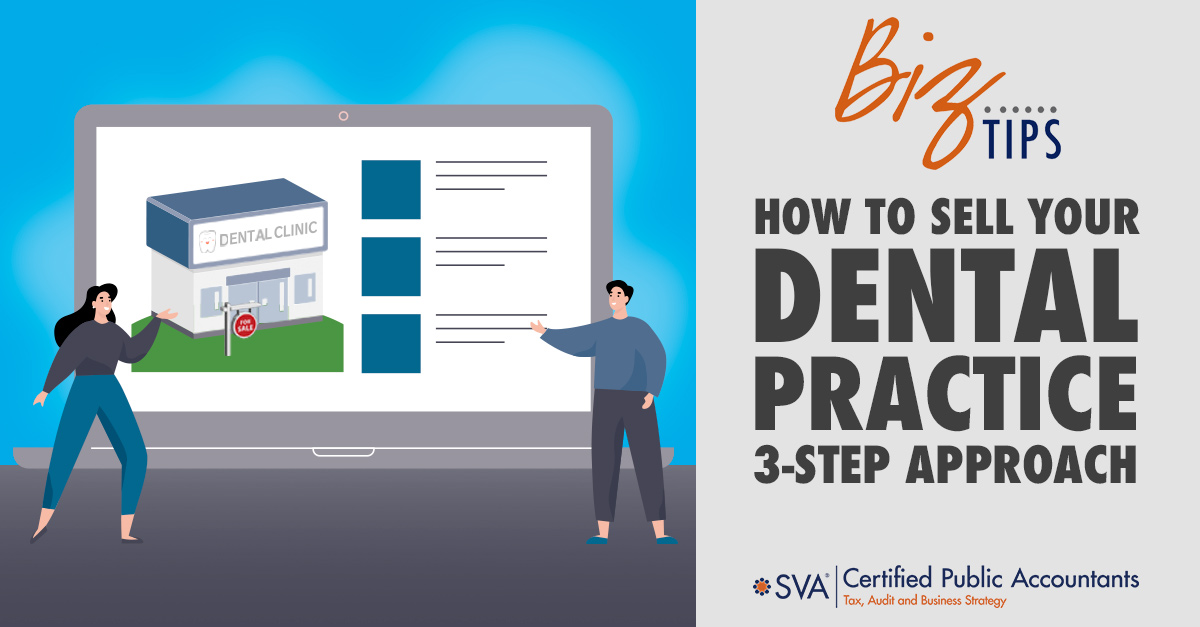| Highlights: |
- The article presents a three-step approach to selling a dental practice, focusing on preparation, valuation, and executing a successful transaction.
- It explains how improving financial performance, operational efficiency, and documentation can increase practice value and attract qualified buyers.
- Guidance is provided on timing the sale, assembling advisory professionals, and aligning personal goals with financial and transition outcomes.
|
Selling your dental practice, or even selling a part of your practice to a new partner, is a huge decision in your career.
Much of your professional career has been devoted to growing and improving your practice.
Now that you’re ready to sell, you are probably asking yourself these questions:
- What is the appropriate sales price for my practice?
- How should the deal be structured?
- What will the tax impact be when I sell?
- Will I have enough to retire?
(Download Video Transcript)
3-Step Approach to Selling Your Dental Practice
First: Establish Your Goals
Transitioning out of your practice starts with determining your overall goals and objectives including knowing how much you need to retire.
- Is it essential for you to sell to a partner who will maintain the philosophy of your practice?
- Or are you interested in selling to a dental conglomerate, giving your patients access to more flexibility in services and locations?
Each of these transition options have different planning steps, but one thing they have in common is the need to be realistic in what the practice is worth and how long it will take to transition/sell.
You will need to understand the tax ramifications of a sale/transfer to gain a true picture of what your net proceeds will be post-sale. Are you interested in working part-time or phasing slowly out of the practice?
You’ve spent years building your practice, so you will want to ensure you transition your staff and patients in a way that sets them up for future success.
Second: Get a Valuation
Understanding the current value of your practice, and how you can increase that value if needed, is vital. Start thinking about the sale early enough to allow time to impact your valuation and ultimately the sales price.
To get top dollar for your practice, benchmark and evaluate your productivity, fees, overhead expenses, and insurance contracts. The valuation will include tangible assets as well as intangible assets and goodwill. This can be a large portion of the value of your practice.
Enlist a valuation expert who specializes in dental practice valuations. This is not the time to look for the lowest-cost provider, but rather focus on their expertise in your industry. Before you start the valuation process, you may want to look at a few areas for improvement to help increase the value.
Things to consider pre-valuation/sale:
- Review your fee schedule and determine if your fees align with the marketplace. If your fees are below market, increase them to enhance the value of your practice.
- Evaluate your facilities to determine if there are repairs or cosmetic improvements you could make to enhance the inside and outside of your practice.
- Check your employment agreements for your associates to be sure they have restrictive covenants and non-solicitation clauses. These agreements will protect your practice’s value.
- Review, collect, or purge uncollectable accounts receivable that are over 90 days past due. These unpaid accounts can be a snag in the sale negotiation and due diligence process.
Third: Enlist Your Advisory Team
Once you have the valuation and benchmarks, your advisory team (including an accountant, lender, and legal representative) can appropriately negotiate with the buyer.
Your accountant will allocate the sales price to maximize your tax benefits as well as the cash flow from the sale. They will also help guide you through the tax implications of the sale and recommend the best way to proceed once you decide to sell or transfer the practice.
When assembling your advisory team, ask for referrals. Often one of your current advisors can recommend who to add to your team based on their past working knowledge.
Remember These Tips:
- Start the sale/transition process as early as possible.
- Have a good understanding of the value of your practice to make sure your financial expectations are realistic.
- Keep your facilities up to date and your revenue stream flowing. It is not advisable to reduce your hours, staffing, or patient loads before a sale.
- To keep continuity in the practice post-sale, you may be asked to stay with the practice during a specific transition period. Plan your retirement timing with that in mind.
- Planning, strategy, and analysis will give you the best sales price and comfort level with this vital business transition.

© 2021 SVA Certified Public Accountants

